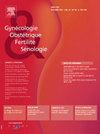[宫内节育器与月经杯结合使用时的泌尿系统感染和排出风险]。
IF 0.6
4区 医学
Q4 OBSTETRICS & GYNECOLOGY
引用次数: 0
摘要
目的:随着宫内节育器(IUDs)避孕的增加,以及月经杯等可重复使用的月经卫生用品的使用日益增多,有必要对其共同使用的影响进行评估。目的是评估与使用其他月经卫生用品的妇女相比,使用月经杯的宫内节育器妇女是否会增加宫内节育器脱出的风险和/或改变上下泌尿生殖道感染的风险:一项观察性、前瞻性、多中心研究于 2020 年至 2023 年在法国进行。参与者由专业医护人员招募,在放置宫内节育器时和一年后通过电话问卷收集数据。主要终点是与未使用月经杯者相比,使用月经杯者的宫内节育器脱出发生率和泌尿生殖道感染发生率:对 119 名妇女进行了分析,其中 25 人经常使用月经杯,5 人发生过宫内节育器脱出。在经常使用月经杯的妇女中,12%的人出现过宫内节育器脱出的情况,而在未使用月经杯的妇女中,这一比例仅为 2.6%,两者在统计学上无显著差异(Chi2 = 3.65;P = .056)。在泌尿生殖道感染方面,月经杯的定期使用者中有 9 名妇女(36%)发生过泌尿生殖道感染,而非使用者或非定期使用者中有 27 名妇女(34.6%)发生过泌尿生殖道感染,两者在统计学上无显著差异:结论:月经杯使用者容易将宫内节育器排出体外,这一点值得警惕,但这并不足以成为共同使用的禁忌。因此,医生应系统地筛查此类共同使用情况,并告知患者其风险和监测说明。本文章由计算机程序翻译,如有差异,请以英文原文为准。
Étude RIESC : risques d’infections uro-génitales et d’expulsion dans l’association stérilet et coupe menstruelle
Objectives
The increase in intrauterine devices (IUDs) contraception, and the growing use of reusables menstrual hygiene products such as the menstrual cup, necessitates an assessment of the implications of their co-use. The objectives are to assess whether women with IUDs who use menstrual cups have an increased risk of IUD expulsion and/or a change in the risk of upper and lower urogenital tract infections compared to women who use other menstrual hygiene products.
Method
An observational, prospective, multicenter study was conducted in France between 2020 and 2023. Participants were recruited by health professionals and data were collected by telephone questionnaire at the time of IUD insertion and at one year. The primary endpoints were the occurrence of IUD expulsion and the occurrence of urogenital tract infections in menstrual cup users compared to non-users.
Results
One hundred and three women out of 119 included were analyzed, 25 of them were regular menstrual cup users and five experienced IUD expulsion. Among regular users, 12% experienced IUD expulsion compared to 2.6% among non-users, with no statistically significant difference (Chi2 = 3.65; P = 0.056). Regarding urogenital tract infections, nine women (36%) of the regular menstrual cup users had urogenital infections, compared with 27 (34.6%) of the non-users or not regular users, with no statistically significant difference.
Conclusion
The tendency of menstrual cup users to expel their IUDs is a reason for caution, although it is not sufficient to contraindicate co-use. Physicians should therefore systematically screen such co-use and inform patients of the risks and monitoring instructions.
求助全文
通过发布文献求助,成功后即可免费获取论文全文。
去求助
来源期刊

Gynecologie Obstetrique Fertilite & Senologie
Medicine-Obstetrics and Gynecology
CiteScore
1.70
自引率
0.00%
发文量
170
期刊介绍:
Gynécologie Obstétrique Fertilité & Sénologie est un mensuel scientifique d''information et de formation destiné aux gynécologues, aux obstétriciens, aux sénologues et aux biologistes de la reproduction. La revue, dans ses éditoriaux, articles originaux, mises au point, lettres à la rédaction et autres rubriques, donne une information actualisée ayant trait à l''obstétrique et à la gynécologie et aux différentes spécialités développées à partir de ces deux pôles : médecine de la reproduction, médecine maternelle et fœtale, périnatalité, endocrinologie, chirurgie gynécologique, cancérologie pelvienne, sénologie, sexualité, psychosomatique…
 求助内容:
求助内容: 应助结果提醒方式:
应助结果提醒方式:


